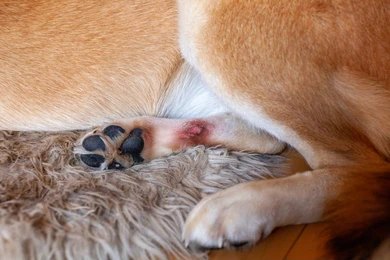This behavior can be frustrating for many dog owners. While occasional paw licking is normal, excessive paw licking may indicate an underlying problem. There are many reasons why dogs lick their paws, including simple grooming, allergies, injury, or stress.Understanding the reasons is essential to keeping your furry friend healthy.
In this article, we’ll look at the top reasons why dogs lick their paws and give you ideas on when to talk to your veterinarian. Stay tuned for important tips to keep your dog happy, healthy and comfortable!
Why dogs lick their paws
Licking is a natural, soothing behavior for dogs. It helps release dopamine and endorphins, promoting relaxation. Occasional paw licking is typically harmless, but if your dog is persistently licking their paws or showing signs of aggressive licking, it could indicate itchy skin or an underlying health issue. It’s important for pet parents to pay attention to this behavior, as it may also point to a behavioral concern that requires attention.
11 causes and solutions of excessive paws licking
There are many reasons why dogs lick their paws. It’s always good for your furry friend to lick you every now and then. However, if your dog has started licking their paws excessively, it could be a health issue. The reason your dog licks their paws could be anything from itchy skin to allergies to even ingredients in their food.
Here are 11 reasons why dogs lick their paws and effective solutions for each.
01. Self-grooming.
Like cats, dogs often lick their paws and other parts of their body as part of their self-grooming routine. After walks or playtime in the yard, it’s perfectly normal for your pup to lick their paws to remove dirt or debris. Paw licking for cleaning purposes is common in dogs.
However, if your dog begins licking their paws excessively, it may indicate an underlying health issue that requires attention.
Solution
To reduce your dog’s paw licking after playing outside, wash their paws with warm soapy water and a cloth. Keeping your dog’s paws clean can reduce the need for excessive grooming and licking behavior.
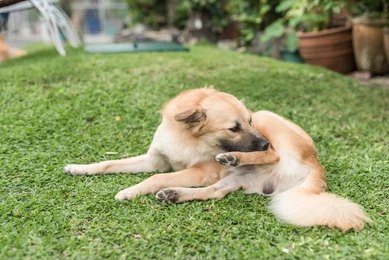
02. Boredom
Dogs are social animals that love to interact and play. They can feel lonely or anxious when left alone. Therefore, your dog will lick their paws to relax and pass the time when you are not around.
Solution
To prevent stress, encourage your dog to participate in activities that stimulate his mind. Pet owners can help reduce the tendency to lick his paws due to boredom or stress by making their pet’s life enjoyable with interactive toys, exercise, and good times together.

03. Anxiety
While some dogs experience anxiety or generalized anxiety, some dogs are more prone to these problems. When dogs are stressed, they lick their paws excessively for self-gratification, to calm their nerves
Solution
If stress is causing your dog to lick their paws, there are several treatment options available. Consult a veterinarian for personalized advice, or consider using products like diffusers or treatments to help your dog stay calm and reduce excessive licking.

04. Behavioral Issues
A behavioral issue, such as compulsive behavior, could be the cause of your dog constantly licking their paws. Dogs may develop compulsive licking for several reasons, including:
Lack of mental stimulation
Anxiety
Frustration
Lack of attention
Solution
If you think your dog’s excessive licking is due to a behavioral problem, consult a dog trainer for guidance on how to address the problem. You can also keep your dog occupied and less likely to scratch his paws by giving him fun toys.

05. Food Allergies
Allergies occur when your dog’s immune system reacts to certain substances and causes inflammation. All breeds of dogs have allergies, and like humans, dogs can experience many types of allergies. Food allergies, in particular, can cause irritation to your dog’s skin. These allergies can be difficult to diagnose, but if your dog is allergic to certain foods, he will try to relieve the itching by licking his paws more.
Solution
To treat food allergies that cause excessive paw licking, your vet may recommend a special diet for your puppy. Or they may suggest removing certain ingredients from your dog’s food to be mindful and avoid any interactions.
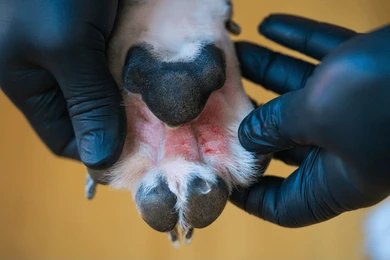
06. Environmental Allergies
Sensitivity to grass, trees, and airborne substances is more common in dogs than you might think. Environmental allergies can cause more than just paw irritation. Common symptoms of environmental allergies in dogs include:
Flaky skin
Runny nose
Itchy throat
Sneezing
Solution
Environmental allergies are relatively simple to treat. First, have your veterinarian test you to determine the environmental triggers that are causing your dog’s discomfort. Your veterinarian may recommend over-the-counter medications to help your pet feel comfortable. For more severe allergies, they may prescribe medications or vaccinations to help control the condition and reduce the need for excessive paw licking.
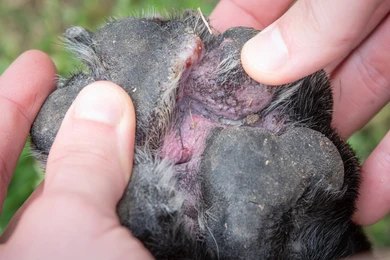
07. Flea Allergies
Flea allergy dermatitis is a common allergic reaction in dogs. When fleas bite your dog, their skin becomes irritated, causing itching and scratching. In addition to skin irritation, flea allergy dermatitis can cause your dog to lick their paws excessively to relieve the itching.
Solution
Dog owners should protect their pets with monthly flea and tick treatments. While these treatments do not prevent flea allergies, they can prevent fleas from biting your dog. If your dog’s itching and paw-licking do not improve after flea treatment, check your home for fleas and take appropriate action.
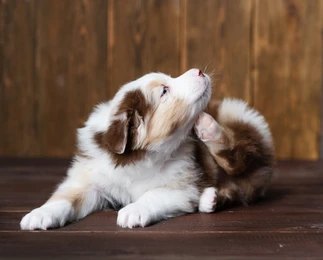
08. Digestive Issues
Constant licking can be a sign of discomfort, but it doesn’t always mean your dog’s skin is itchy. Your pet’s discomfort may be due to digestive issues. Having a healthy intestinal system is very important for healthy skin and a beautiful coat. Your dog’s diet also plays an important role in preventing excessive itching.
According to research, 80% of dogs’ immune systems are located in the intestines, meaning that dogs with unhealthy intestines don’t have healthy skin either. If your dog licks their paws frequently and has digestive issues, this may be due to a condition such as gastrointestinal upset.
Solution
Adding a supplement or multivitamin to your dog’s diet will help improve intestinal health. If your pup’s condition appears to be more severe, it’s best to consult your veterinarian about dietary changes to help resolve the problem and reduce excessive paw licking.
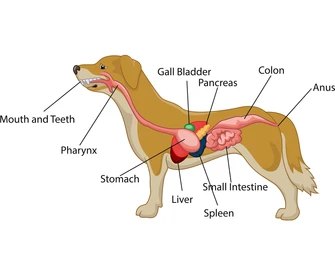
09. Bacterial And Yeast infections
If your dog is constantly licking his paws, it’s possible that the infection has progressed to the secondary stage. Frequent licking can irritate the skin and lead to infections or fungal infections. Fungal and bacterial infections often cause itching, redness, and swelling, making the paw-licking behavior even worse. If left untreated, these infections can affect your dog’s immune system and make the condition worse.
Solution
Yeast infections, bacteria and other secondary infections caused by excessive paw licking in dogs can be treated with antibiotics or antifungal medications.

10. Pain
A very sick dog may lick their paws frequently to comfort themselves. Conditions such as arthritis and hip dysplasia are common causes of pain in dogs that can cause them to lick their paws excessively.
Solution
You will need to visit your veterinarian to check for conditions such as arthritis or hip dysplasia. Your veterinarian will recommend treatments to help control pain caused by the condition and reduce excessive paw-licking behavior.

11. Injuries
Excessive paw licking, especially when focused on one paw, may indicate an injury to the paw pad. Common injuries that can cause this behavior include:
Torn nails
Ingrown toenails
Blisters from hot spots
Cuts or scrapes
Insect stings
Insect bites
If your dog’s paw licking starts suddenly and is focused on one paw, it’s important to check their paw pad for injuries. Inspect your dog’s nails, paw pads, the area between their toes, and the tops of their feet closely for any signs of damage
Solution
If you think your dog has an injury to their paw but can’t treat it yourself, see your veterinarian to remove any foreign objects stuck in their paw. In the meantime, protect the injured paws with shoe covers or bandages from your pet’s first aid kit, and keep your dog’s paw pads healthy by using ointments and creams.
Don’t worry if you see your puppy licking their paws; licking their paws is a normal dog behavior. However, if your dog starts licking and chewing their paws excessively, it’s best to see your veterinarian to check for any health issues.
